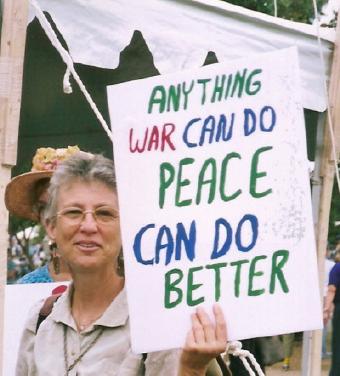|
The following article first appeared in Harmony, Sept.-Oct., 1987; revised July, 2001. Copyright © 1987 & 2001 by Mary Meehan.  Changing Hearts and Minds Mary Meehan What is it that turns people around on issues of life and death? What leads them to choose life? For William Whistler, who once did weapons work for General Electric, it was his own internal doubts plus the protest of the Brandywine Peace Community. In an interview years ago, Whistler remarked that he left one job to get away from military work--only to find that the G.E. division he switched to was being "co-opted by the military." General Electric was deep into nuclear-weapons work, and he decided that he had to leave the company altogether. Brandywine activists soon handed out his leaflet on "Why I Quit G.E." to his former colleagues. (G.E. later sold its key weapons division to Martin Marietta, which merged with Lockheed to form Lockheed Martin.) I once saw excellent leafleting at the Pentagon by Elizabeth McAlister and other peace activists during a Good Friday protest against nuclear weapons. The peace people were polite and cheerful; unlike some demonstrators, they knew that being polite is not selling out. Replying to a "Happy Easter!" from one leafleter, a military man said, "Thank you. God bless you." Judith Fetrow, who used to work in a California abortion clinic, had experience with counter-productive demonstrators and also with one who was very good. Fetrow had developed severe doubts about her work. At one point, she started to walk away from the clinic--only to be confronted by a demonstrator outside who shouted, "Murderer! The blood is on your hands!" Other demonstrators joined the denunciation of Fetrow, who felt as though "someone had kicked me in the stomach." She returned to her work in the clinic. But she had a very different experience with a pro-life sidewalk counselor named Steve. Instead of denouncing her, he chatted with her in a friendly way. The two developed "a friendship across the lines" that helped Fetrow leave the clinic permanently and speak out on the pro-life side. The humble letter to the editor also plays its role. Years ago an early participant in sit-ins at abortion clinics told me that he had been either neutral or "pro-choice" on abortion until he saw a good letter to the editor from the other side. That's what spurred him to rethink the issue. Sometimes just one question, asked in a non-threatening way, prompts someone to take another look at an issue. For a "personally-opposed--but" person, the question may be: "Well, why are you personally opposed to it?" For someone who is undecided about the death penalty, it might be: "If you had to pull the switch, or give the lethal injection, would you do it?" Sister Helen Prejean, a leading anti-death penalty campaigner, once noted that most people are "really ambivalent" about capital punishment. "You can work with ambivalence, almost always," she said. She also remarked, "You have to find a graceful way of doing it." That is good advice for changing people's hearts and minds on any issue. There is no substitute for courtesy and a genuine interest in the other person and their point of view. Good listening often suggests ways of approach that may be more effective. It may also lead to hearing personal experience of others that explains why they see things the way they do. It's important to avoid glib statements or words, such as referring to pregnancy as merely "inconvenient." A woman who has been ordered to bed-rest for months to save her child, or one endangered by pre-eclampsia, does not take kindly to such a description. Some anti-death penalty activists keep saying that an execution cannot bring a murderer's victim back to life. A victim's family members are already painfully aware of this fact. To keep saying it is to rub salt into their wounds. Relating your own personal experience might have a positive impact. Perhaps a pregnant friend has been thrown into a tailspin by the news that her child has Down Syndrome or spina bifida. You might be able to reassure her by telling her about your sister, brother or child who has the same condition. Or perhaps someone says they support abortion for poor women because they think it's terrible for a child to grow up in poverty. Possibly you can say, "Hey! I was poor once. Didn't like it. But I was certainly glad to be alive!" Mentioning alternatives to violence may enlarge someone's perspective in a positive way. "Did you know about the three pregnancy aid centers in our city? They provide everything from counseling to free maternity clothes, layettes, and baby formula." Or: "Have you heard about Project Life out in Detroit? They offer all sorts of practical aid to people with severe disabilities or terminal illness--desperate people who might otherwise commit suicide." Or: "Are you familiar with the idea of civilian-based defense? That's where you organize people in advance to refuse any kind of cooperation with an aggressor." "Let your life speak," the Quakers say. Activists who really live their beliefs--and who communicate a true joy of life--make conversions by their good example and their sheer zest for life. Helen Alvaré, an attorney who for years was a leading pro-life spokeswoman, remarked last year that "people are more or less attracted to your message in direct proportion to whether they are...attracted to your person." She listed several key questions about an audience: "Do they like people like you?....Do they like the world view you're selling? Do they want to live there?" Liane Norman, a Quaker peace activist, once said that each culture has its special story and that the West has a thrilling one of war. She acknowledged that when Shakespeare's King Henry V cries, "Once more unto the breach, dear friends, once more," she's ready to go right along with him. Nonviolent activists, she said, must tell their own story, and it must be colorful and courageous. There are many such stories out there. U.S. history offers the example of the anti-slavery movement and the Underground Railroad, which involved great personal courage and many exciting rescue stories. The history of the U.S. peace movement includes many examples of bravery--including that of politicians such as the senior Robert La Follette, who spoke boldly against U.S. involvement in the First World War, and Eugene McCarthy, whose 1968 presidential candidacy against the Vietnam War sent shock waves through the U.S. establishment. Today's activist movements offer many stories of quiet courage and valiant rescue efforts. Often the key is to start your conversation or speech with a story, rather than an earnest philosophical monologue. There's a place--and an important one--for philosophy, but that place usually is not at the beginning of a conversation. When you do reach philosophy, you have to start with people where they are. A conservative may respond well to the notion that the death penalty gives the government too much power. (As conservative columnist George Will wrote last year, "Capital punishment, like the rest of the criminal justice system, is a government program, so skepticism is in order.") A liberal will understand quickly the point that legalized euthanasia would place poor people in special danger. There is often a temptation to lambaste someone for being inconsistent, as in: "How can you be against war--but for abortion? Aren't you being hypocritical here?" But personal attacks rarely win someone over. More effective is the practice of congratulating someone for whatever good they are doing and encouraging them to extend their good works. The late Lyndon B. Johnson certainly knew how to do this. When he was the Democratic majority leader of the U.S. Senate, and had to deal with Republican President Dwight Eisenhower, Johnson said that the Democrats prodded Eisenhower "into doing everything we can get him to do, and when he does something good we give him a 21-gun salute."  |